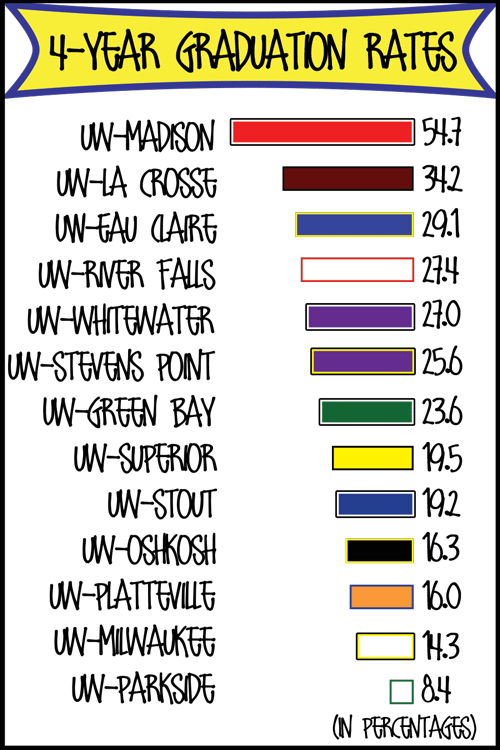Timely graduation rates possible
Preparation and planning key to finishing in desired time
March 12, 2014
Less than 30 percent of UW-Eau Claire students who stay from freshmen year until commencement graduate in four years, yet the institution as a whole has the third highest four-year graduation rate in the UW System, ranking behind UW-Madison and UW-La Crosse.
Despite being in the top quarter of four-year graduation rates among other Wisconsin public universities, Director of Advising Debbie Gough said the 29.1 percent Eau Claire boasts could be even higher through effective planning with advisers.
“It could definitely be improved upon,” Gough said. “I would like to see every student sit down with an adviser and go through the degree audit line by line to make certain they understand everything in it.”
Something different about Eau Claire as opposed to La Crosse, Madison and other schools is Eau Claire does not have a professional advising department like they do.
However, Gough doesn’t see that as a bad thing, and she said the university has never really looked into obtaining a full-time advising department because she likes the fact that students can develop a professional relationship with the person who sees them in the
classroom.
“Entirely professional advising system, I think, it leads to large advising loads per adviser, and it is also a disconnect between the student and the major, and I think that’s important,” Gough said.
Senior Jy Corbett is one student who falls in the minority of students who will graduate in four years. After two years, the marketing major switched his adviser to someone in the college of business, Abbie Windsor, and said he has become more comfortable going to her.
“She’s been super helpful,” Corbett said of Windsor. “Whether she has time or not, I know I can always walk in there and ask her a quick question or a few things, and she’s always pointed me in the right direction.”
However, Gough said there are plenty of challenges to increasing the institution’s four-year rate.
She said some of the Blugold Commitment money, a $900 charge on top of student tuition, is dedicated to fund advising in each of the colleges, where certain staff members would be devoted to focus more on student advising than others.
However, the last stage of staggered Blugold Commitment money was put on hold along with a tuition freeze passed in the state budget last summer.
Also, Gough said the university and students miscommunicate when balancing the study abroad option and graduating on time.
But the biggest concern students have, she said, is not being able to get into classes they need, which pushes graduation back.
To avoid that, the university and students need to connect better, she said.
“If a class is closed, students really need to be persistent,” Gough said. “They need to go to the chair of the department, if necessary, even up the ladder. A student should always be able to get the classes they need to graduate. And that has happened, and in almost all cases I know, is if you’re persistent enough, they’ll get you in the class.”
Corbett said while it is nice to have help from administrators within the system, it all boils down to the profile of the student and being able to take care of business. He said if you do that and make sacrifices here and there, students should be able to finish when they want, no matter how busy they might be outside the classroom.
“You just have to set apart a time of day to get your homework done,” Corbett said. “And when your friends go out to party, wherever they may be, doing fun stuff, you’ve just got to sit down and get your homework done.”
The bottom line, Gough said, is it should be up to the student when they want to graduate. If students want to stay longer, graduate in four years or earlier, there should be no external conflicts holding them back as long as they prepare and communicate.



